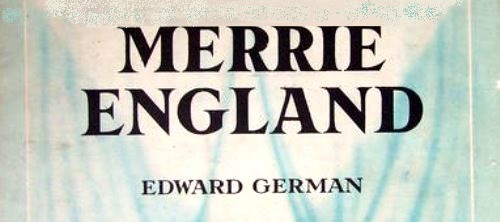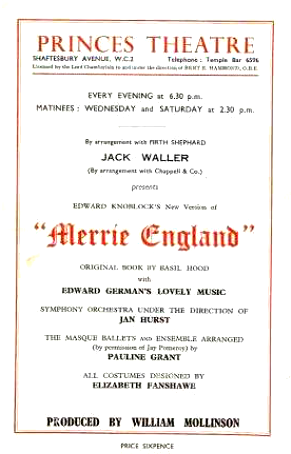
Merrie England is an English comic opera in two acts by Edward German to a libretto by Basil Hood. The patriotic story concerns love and rivalries at the court of Queen Elizabeth I, when a love letter sent by Sir Walter Raleigh to one of Queen Elizabeth’s Ladies in Waiting, Bessie Throckmorton, ends up in the hands of the queen. Well-known songs from the opera include "O Peaceful England", "The Yeomen of England" and "Dan Cupid hath a Garden".

Version 3
Merrie England (1934-09-Princes Theatre-London)
Type de série: RevivalThéâtre: Shaftesbury Theatre (Londres - Angleterre) Durée : 5 mois 1 semaine Nombre : 187 représentationsPremière Preview : jeudi 06 septembre 1934Première : jeudi 06 septembre 1934Dernière : samedi 16 février 1935Mise en scène : William J. Wilson • Chorégraphie : ???? ???? • Producteur : Avec : Enid Cruickshank (Queen Elizabeth), Joseph Hislop (Walter Raleigh), Nancy Fraser (Bessie), Edgar Owen (Earl of Essex), Walter Passmore (Walter Wilkins)Commentaires longs: This first revival was notable for the star performance by the Scots tenor Joseph Hislop. The part of Bessie was played by Nancy Fraser - the daughter of Agnes Fraser who was the original Bessie 32 years earlier.
The opera deals with love and rivalries at the court of Queen Elizabeth I, a monarch jealous of Sir Walter Raleigh's affection for Bessie Throckmorton, revealed to her by the Earl of Essex. It perpetuates the fiction that the England of Good Queen Bess was actually merry and includes the well known song for the Queen, O peaceful England, and the stirring The Yeomen of England as well as the ballad Dan Cupid hath a Garden.
It opened at the Savoy Theatre in London on 2 April 1902, under the management of William Greet, and ran for 120 performances, closing on 30 July 1902. The piece then toured while the Kitty Loftus Company played at the Savoy. The production reopened at the Savoy on 24 November 1902 for 56 additional performances, ending on 17 January 1903. It starred Henry Lytton, Louie Pounds, Rosina Brandram, Robert Evett and Walter Passmore, among other regulars of the Savoy.[1]
The opera became popular in Britain and was often performed by amateur groups in the decades following its premiere. In Queen Elizabeth II's coronation year (1953), over five hundred amateur societies staged the piece. Merrie England was recorded complete with its composer conducting, issued by HMV in 1918 on ten double-faced 12-inch 78 rpm records (20 sides). A recording of selections from the piece was made in 1931 on the Columbia label, with Clarence Raybould conducting "Under the Supervision" of the composer.[2] Since then, a few more complete recordings have been made, including an HMV set in 1960, and individual songs from Merrie England have been recorded many times.
Despite its lively and accessible music and libretto, the piece has fallen into relative obscurity in recent decades, although anniversaries such as that of the Armada in 1988 and the queen's silver (1977), golden (2002) and diamond (2012) jubilee years have seen many revivals. Opera South produced a revival in February 2012.[3] Professional revivals in 2012, the year of the queen's diamond jubilee, included a production by the Finborough Theatre in London.[
Introduction (Includes "Hey, Jolly Robin", the Rustic Dance, and the Jig)
Act I
01. "Sing A Down, A Down, A Down" (Chorus with May Queen and Butcher)
02. "We Are Two Proper Men" (Long Tom and Big Ben with Chorus)
03. "Oh! Where The Deer Do Lie" (Jill with Chorus)
04. "I Do Counsel That Your Playtime" (Wilkins with Chorus)
05. "That Every Jack Should Have A Jill" (Raleigh with Chorus)
06. "Love Is Meant To Make Us Glad" (May Queen, Kate, Raleigh, Wilkins, and Long Tom)
07. "She Had A Letter From Her Love" (Bessie)
08. "When True Love Hath Found A Man" (Raleigh and Bessie)
09. "When A Man Is A Lover" (Wilkins, Simkins, and Essex)
10. "Who Were The Yeomen Of England, The Yeomen of England" (Essex with Chorus)
11. Entrance Of Queen Elizabeth/"God Save Elizabeth" (Chorus)
12. "O Peaceful England" (Elizabeth with Chorus)
13. "King Neptune Sat On His Lonely Throne" (Wilkins with Chorus)
14. Finale (Ensemble)
Act II
15. "The Month o' May Has Come Today" (Chorus with Jill)
16. "In England, Merrie England" (Bessie, Jill, Big Ben, Long Tom)
17. "The Sun in the Heaven Is High" (Simkins, the Tailor, and the Butcher with Chorus)
18. "The Big Brass Band" (Wilkins and Simkins with Chorus)
19. "It Is the Merry Month of May" (Jill and Raleigh)
20. "The Queen o' May Is Crowned Today" (Chorus)
20a. Rustic Dance
21. "Dan Cupid Hath a Garden" (Raleigh)
22. "Two Merry Men a-Drinking" (Ensemble)
22a. Exit of Chorus
23. "O Who Shall Say That Love Is Cruel?" (Bessie)
24. "When Cupid First This Old World Trod" (Essex with Bessie, Jill, and Raleigh)
25. "Perhaps You Don't Imagine" (Wilkins)
26. Masque of St. George and the Dragon (Egyptian Dance)
27. "Oh! Here's a To-Do to Die To-day" (Chorus with Wilkins as King)
28. Finale (Ensemble)
Aucun dossier informatif complémentaire concernant Merrie England
Basil Hood's libretto makes heavy use of wordplay for comic (and dramatic) effect. For example the homophones 'fore' and 'four' are used in a scene in the second act where it is explained that a dragon has "four legs, two of which are hind legs and two of which are fore legs" (compare this with the famous 'orphan'/'often' exchange in Act one of The Pirates of Penzance, by Gilbert and Sullivan).
The poem in Act One giving the A to Z of Romeo and Juliet is a particularly fine example of Hood's writing, summarising the plot of Romeo and Juliet through use of the alphabet. The plot, a rustic, romanticised Tudor story, has been criticised for containing too many unimportant characters and for historical inaccuracy. It concerns love and rivalries at the court of Queen Elizabeth I, who is portrayed as jealous of Sir Walter Raleigh's affection for her Lady in Waiting, Bessie Throckmorton. This relationship is revealed to the queen by the Earl of Essex, who transmits a love letter written by Raleigh to Throckmorton, which the queen initially assumes was meant for herself. Ultimately, however, the queen chooses Essex as her lover and forgives Throckmorton.
The music is an example of the style of English light opera made famous in the 1870s and 1880s by Gilbert and Sullivan. It features a prominent chorus and a range of principal numbers including ballads, patter songs, duets and quintets. German had gained a lot of practical knowledge about style and orchestration from completing Arthur Sullivan's score for The Emerald Isle, and he put this into practice in Merrie England, which was his own first large-scale work for the stage. German's engaging score, evoking the colourful Tudor period, combines pomp and ceremony with ballads and romantic arias. It includes the well known song for the Queen "O peaceful England" and the stirring "Yeomen of England", which became a favourite and was performed at Queen Elizabeth II's Jubilee celebrations in 2002.

Version 1
Merrie England (1902-04-Savoy Theatre-London)
Type de série: OriginalThéâtre: Savoy Theatre (Londres - Angleterre) Durée : 3 mois 4 semaines Nombre : 120 représentationsPremière Preview : mercredi 02 avril 1902Première : mercredi 02 avril 1902Dernière : mercredi 30 juillet 1902Mise en scène : Basil Hood • Chorégraphie : ???? ???? • Producteur :

Version 2
Merrie England (1902-11-Savoy Theatre-London)
Type de série: Return EngagementThéâtre: Savoy Theatre (Londres - Angleterre) Durée : 1 mois 3 semaines Nombre : 56 représentationsPremière Preview : lundi 24 novembre 1902Première : lundi 24 novembre 1902Dernière : samedi 17 janvier 1903Mise en scène : Basil Hood • Chorégraphie : ???? ???? • Producteur :

Version 3
Merrie England (1934-09-Princes Theatre-London)
Type de série: RevivalThéâtre: Shaftesbury Theatre (Londres - Angleterre) Durée : 5 mois 1 semaine Nombre : 187 représentationsPremière Preview : jeudi 06 septembre 1934Première : jeudi 06 septembre 1934Dernière : samedi 16 février 1935Mise en scène : William J. Wilson • Chorégraphie : ???? ???? • Producteur : Avec : Enid Cruickshank (Queen Elizabeth), Joseph Hislop (Walter Raleigh), Nancy Fraser (Bessie), Edgar Owen (Earl of Essex), Walter Passmore (Walter Wilkins)Commentaires longs: This first revival was notable for the star performance by the Scots tenor Joseph Hislop. The part of Bessie was played by Nancy Fraser - the daughter of Agnes Fraser who was the original Bessie 32 years earlier.

Version 4
Merrie England (1944-10-Winter Garden Theatre-London)
Type de série: RevivalThéâtre: Winter Garden Theatre (Londres - Angleterre) Durée : 1 mois 2 semaines Nombre : 52 représentationsPremière Preview : jeudi 19 octobre 1944Première : jeudi 19 octobre 1944Dernière : samedi 02 décembre 1944Mise en scène : Harry Knight • Chorégraphie : Alison Maclaren • Producteur : Avec : Gladys Palmer (Queen Elizabeth), Walter Midgely (Walter Raleigh), Victoria Campbell (Bessie), Reginald Gibbs (Earl of Essex), Charles Hawtrey (Walter Wilkins)Commentaires longs: The young Charles Hawtrey appeared in this show. This revival was
not a great success, and was not helped by the ongoing threat of rocket
attacks and the second prolonged “blitz” on London. The production closed
on December 2nd after just 52 performances.

Version 5
Merrie England (1945-09-Princes Theatre-London)
Type de série: RevivalThéâtre: Shaftesbury Theatre (Londres - Angleterre) Durée : Nombre : 365 représentationsPremière Preview : jeudi 06 septembre 1945Première : jeudi 06 septembre 1945Dernière : InconnuMise en scène : William Mollison • Chorégraphie : Pauline Grant • Producteur : Avec : Cast: Linda Grey (Queen Elizabeth), Heddle Nash (Walter Raleigh), Anna Jeans (Bessie), Dennis Noble (Earl of Essex), Morris Sweden Charles Hawtrey (Walter Wilkins)Commentaires longs: This revised version made considerable changes to the original show, cutting several characters and interpolating two ballets and a hornpipe. With the famous tenor Heddle Nashe and its fortuitous timing at the end of six years of war, this was a rousing success, running till July 20th 1946 and notching up 365 performances. This version would be revived by the National Light Opera Company for 15 performances at the London Coliseum (Jan 23 - Feb 3, 1951) as part of the Festival of Britain celebrations. Another version, revised by Dennis Arundell would be performed in repertoire by the Sadler’s Wells Opera Company from August 10th 1960.

Version 6
Merrie England (1960-08-Sadler's Wells Theatre-London)
Type de série: RevivalThéâtre: Sadler's Wells (Londres - Angleterre) Salle : TheatreDurée : Nombre : Première Preview : mercredi 10 août 1960Première : mercredi 10 août 1960Dernière : InconnuMise en scène : Dennis Arundell • Chorégraphie : James Robertson • John Barker • Producteur : Avec : Anna Pollak, John Hargreaves, John Carolan, Joan Stuart, Patricia Kern, Denis Dowling, Ava June, Leon Greene, Sylvia Rowlands, John Holmes, Alfred Oldridge
Pas encore de video disponible pour ce spectacle